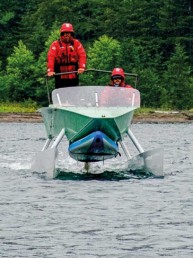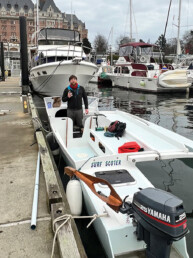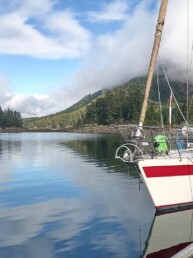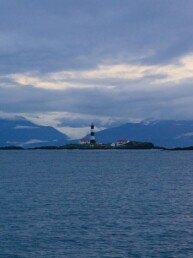
Perched on the leeward rail of a Moorings 485, I watched the tell tales on the jib stream aft and a rocky point slip by our port side. Soon, hoots and hollers went up from my three person crew while sailing close hauled through the finish line with a boat just to windward and a great shot at winning the week’s first race and challenge. Sure enough, when the results were calculated hours later, our team had squeaked out the victory. It was a lead they wouldn’t relinquish throughout the week.
I had the good fortune of spending the past week in the British Virgin Islands as a sailing coach for the Emory University Goizueta Buisness School MBA leadership training program. I’ve done these weeklong courses with them before and this year the timing was right for me to come back again as an instructor.

The aim of Emory’s leadership training curriculum is to take students into an entirely unfamiliar environment and then give them a new challenge, race or task to complete as a team each day. While hopping from one idyllic anchorage to another, onboard coaches are there to teach them how to sail, navigate, live aboard a sailboat and to be better leaders. And though we’re not allowed to help them win the challenges, it’s hard not to get swept up in the action of them duking it out under beautiful sunny skies and warm Caribbean breezes.


The dynamics and details of it all can be quite complicated, but this year was a blast. We had four boats competing against one another and each challenge was designed to have them racing and strategically navigating to gain an advantage over their competitors. Every day was different and it was exciting to see how the teams handled adversity as they thought through and executed each challenge — some better than others.
These training weeks aren’t just about the competition between the teams, though. It’s also a chance to connect with some great people and I’m happy to say I did that once again. Our team’s success was based upon their ability to learn quickly, communicate effectively and work together as a group. I was proud to guide them all and now consider them each to be a friend. To me, besides the learning, that’s what the week is all about.



Unfortunately, It wasn’t all fun and games this time. On the ferry ride from St. Thomas to Tortola, the signs of damage from Hurricane Irma were readily apparent. Boats were strewn on beaches, tarps acted as makeshift roofs and windows were blown in, yet to be replaced.
None of that was comparable to what Road Town, Tortola looks like — literally, like bombs went off.
After my sailing time was over, my friend Kevin and I found our old friend Boots, who is a cab driver and owns an apartment I used to stay in while working as a captain and instructor in the islands. He took us on a tour of town to show us his house and the apartment, the downtown area, high school and some of the waterfront. When we pulled up to the apartment, my old abode was almost unrecognizable. The roof was gone and the inside was mostly empty. Apparently, when the roof was blown off by the over 200-mile per hour winds, everything inside was literally sucked out. Gone.

Fortunately, Boots is in the process of fixing the place up and putting on a roof that is more structurally sound. As we made our way down towards the heart of town we witnessed more of the carnage and, though he said it was the most traumatic thing he’d ever experienced, Boots remained his upbeat self. It was great to see him again.
Winding our way through Road Town, nearly every way we looked buildings were in some state of destruction. The high school was mostly demolished and rows of desks sat neatly arranged on a slab of concrete with no walls around them or a roof overhead. The students go to classes half-time now, as they don’t have a space big enough for all of them to learn.
In the moment I thought about how boats and sailing don’t really matter, it’s the people and their lives that matter most. But in reality, boats and sailing actually play a big role in this community. Tourism is the lifeblood of the Caribbean and it’s the dollars spent by visitors that will help. One of the best things we can all do is to come back. I surely will.
The road ahead for the BVI, and many other Caribbean islands, is going to be a long one. But people are working hard and I’m confident their island spirit will carry them through.
Andy Cross
Andy Cross is the editor of 48° North. After years cruising the Pacific Northwest and Alaska with his family aboard their Grand Soleil 39, Yahtzee, they sailed south and are currently in the Caribbean Sea. You can follow their adventures at SailingYahtzee.com.






